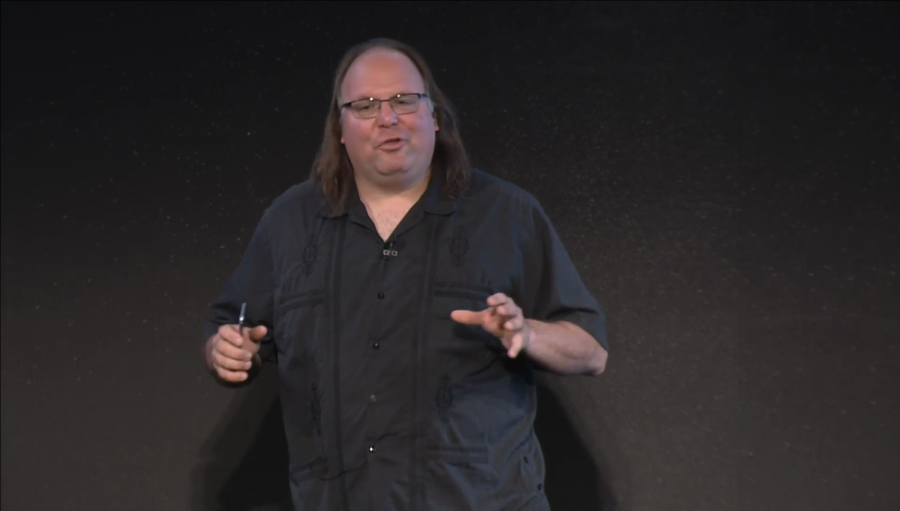Good morning, everybody. Thank you so much for being here. And just before I get into talking about the conference and the logic of today, just a little bit on ground rules. This conference is entirely public. It’s entirely on the record. You are already as we speak under video surveillance by robotic cameras in all corners, and this is so that we’re able to livestream this. But we absolutely encourage you to blog, to tweet, to share in whatever way you feel like sharing. I suspect there are Pokémon to capture somewhere in this building, but if you do, make sure that you’re talking about the forbidden nature of it at the same time. The hashtag for the events is #forbiddenml. And so we’d love it if you would jump on and use that tag.
Joi mentioned a little bit about how this event came about. For me, this event really started with a student mine Jeremy Rubin. And Jeremy, in late 2013, was part of a team that put together a new little technology called Tidbit. Tidbit was basically a system that instead of forcing you to look at an ad when you read a web page, grabbed your browser and had you mine bitcoins. And if you happened to turn up any bitcoins, they went to the people who had created the content.
And we thought this was sort of a clever idea, a proof of concept. But it turned out that the New Jersey Attorney General really did not like this idea, and responded to this idea with a subpoena. And as a result, Jeremy found himself not working on innovative research but working on a pretty innovative legal defense. And many many thanks to our friends at EFF who made that possible.
But we found, looking at this, that this raised real questions about what we as MIT, as an academic institution, do when students and members of our community find themselves in trouble because of research that they’ve taken on. And this isn’t just about Jeremy Rubin. This is about Star Simpson. This is very much about Aaron Swartz. This is about people whose innovations find themselves pushing the limits and bumping up against legal issues, different ways of preventing people from answering questions that’re deeply important to ask.
And so we threw a conference last fall called Freedom to Innovate. We were trying sort of an affirmative tack on this. How would we actually go ahead and find ways to protect this freedom, this freedom to take on novel new research, and to try to figure out how to protect ourselves from legal barriers to it. But as we entered into that conversation, we found ourselves realizing that it’s not just the legal side of things that has us bumping up against limits to forbidden research. In fact Karrie Karahalios, who’s going to be speaking later today, brought up this amazing topic, this idea that we need the ability to be able to audit algorithms to find out whether they’re racially biased. And it turns out that this bumps into all sorts of legal restrictions, but also restrictions about how we’re expected to use web sites. How we think those sites are supposed to be used and not used.
And as we dug into this topic, we realized research gets forbidden for all sorts of reasons. We’re going to talk about topics today that are forbidden in some sense because they’re so big, they’re so consequential, that it’s extremely difficult for anyone to think about who should actually have the right to make this decision. We’re going to talk about some topics that end up being off the table, that end up being forbidden, because they’re kind of icky. They’re really uncomfortable. And frankly, if you make it through this day without something making you uncomfortable, we did something wrong in planning this event.
But it’s incredibly important that we look at these forbidden topics. We’re at a particularly dark moment in the United States. We’ve just seen an incredible wave of violence, a wave of violence against people of color at the hands of the police, a wave of violence targeted at police. This is a really terrifying moment. It has a lot to do with gun culture and gun violence in the United States, which we cannot study as a public health issue because Congress in 1996 passed legislation that means that we cannot give money to the CDC to study gun violence.
And we know that restrictions on what we can study and what we can research are restrictions on an open society, as we’re seeing right now in Turkey where Erdoğan’s crackdown is focusing not only on the judiciary but is also focusing on people within universities, including university deans.
At a moment when research is forbidden, it is incredibly important that we find ways to be creatively and prosocially disobedient. And what we’re going to see here is an amazing range of prosocially disobedient researchers on stage, talking about the work that they’re doing and trying to figure out how to brave these restrictions, or thinking about doing and thinking about how to do carefully and ethically.
So I’m incredibly grateful for everyone who’s come here to take the stage today. I am particularly grateful to our opening speaker, who is a man who as a journalist, as a blogger, particularly as a sci-fi author, has explored this idea of protest, of activism, of prosocial disobedience, better than almost anyone else I can think of. I’d like to welcome the stage my friend Cory Doctorow.
